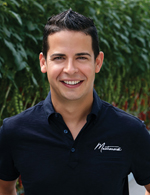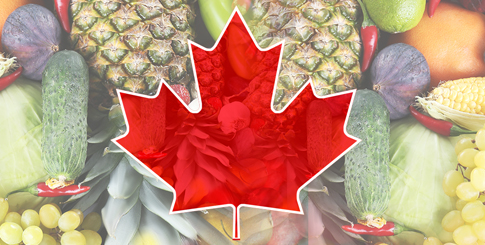As Canada commemorates its sesquicentennial this year, there is much to celebrate. Of course, there are also areas of ongoing concern—and this is true for the fresh produce industry as well. For this year’s True North supplement, we departed from our usual coverage to talk with 14 business leaders who have had a sustained impact on the Canadian fresh fruit and vegetable supply chain.
Among the common characteristics of these influential leaders are their acute vision and ability to juggle personal and professional lives. All are supreme multi-taskers. For most, it’s not enough to lead large companies and develop innovative programs and practices; they are also heavily involved in industry organizations as founders, board members, educators, and advocates.
As you will read, a background in produce is not a prerequisite for a successful career in buying or selling fruits and vegetables. But all of these individuals share a curiosity, enthusiasm, and passion for the produce industry, imbuing their respective companies with fresh insights and, perhaps most importantly, a positive outlook to inspire those around them.


Name: Paul Mastronardi
Title: Chief Executive Officer
Company: Mastronardi Produce Ltd.
Location: Kingsville, Ontario
Working for the family business wasn’t part of Paul Mastronardi’s grand plan. Despite having a storied history in the produce industry—his grandfather built the first commercial greenhouses in North America and his father pushed the envelope on year-round production by building greenhouses in Mexico in the 1970s—the Ontario native eschewed a career amid fresh fruits and vegetables.
He grew up in the business, spending Saturdays loading trucks with his father in the Detroit Produce Terminal. Into his early teens, Mastronardi continued to work part-time in distribution and at the greenhouses, but eventually launched his own business as a disc jockey. Between his success as a young entrepreneur and a plan to study physics in college, Mastronardi never thought he’d come back to the family business. But, as with many youthful aspirations, he had a change of heart.
“Sitting in a basement doing math problems for the rest of my life didn’t seem like it would be that interesting after all,” he says. “Produce is very rewarding. You know you’re producing something healthy for people, and that’s a pretty easy thing to embrace.”
So, in 1994, he joined the family business on a full-time basis. The first item on his to-do list was launching a company research and development department as well as a branding program. This involved traveling the globe to find, bring home, and test thousands of varieties of tomatoes, cucumbers, and peppers, the company’s staple products. The goal: to find the next big thing in flavor.
And that’s exactly what Mastronardi did, developing the now-ubiquitous Campari brand of tomatoes and the Sunset trademark. “It was the first time a tomato had been branded,” he notes, adding, “that’s our family tomato.”
These days, the company has more than 2,000 employees and greenhouses in Ontario, across the United States, and in Mexico. Mastronardi, who has been CEO since 2010, has continued to push the envelope. The first non-GMO-certified produce company in North America, Mastronardi Produce has also made its mark in innovative packaging and high-tech advances, including full traceability. “If we have problems, I wanted to know about it,” he explains. “I wanted to be able to walk into any store and know whose produce was on the shelf.”
Technology figures prominently in the company’s greenhouses, in the form of energy-efficient lighting, automation, insulation, and water conservation. “We produce 20 times the yield of field crops using one-tenth of the water you would use in the field,” he shares. “We embrace technology and productivity.”
As for the future, it looks bright and full of promise. According to government data, fewer than 50 percent of Canadians eat the suggested five servings of fruits and vegetables every day. “That means there’s huge potential for growth in the current industry,” Mastronardi says. “If we can offer fresh fruits and vegetables at the best possible price, we can change consumers’ lifestyles. That is a positive.”


Name: Larry McIntosh
Title: President & CEO
Company: Peak of the Market Sales Ltd.
Location: Winnipeg, MB
Larry McIntosh’s affable manner makes him a natural on-camera commercial spokesperson for Peak of the Market Sales Ltd. based in Winnipeg.
His affinity for the media and enthusiasm for produce have also led him to oversee advertising, promotion, and marketing in his capacity as president and CEO of the not-for-profit company.
Peak of the Market has been McIntosh’s professional home since 1994, but he started with the Bi-Way division of Dylex, Ltd. In subsequent years, he served Bi-Way as vice president of operations then vice president of both Bi-Way and Drug World from 1989 to 1993.
“I saw an ad for the president/CEO position at Peak of the Market, applied, and got the job even though I didn’t have a background in produce,” shares McIntosh. “One of my most important early mentors was Abe Fish, who was one of the owners of Bi-Way. He taught me how to deal with people, suppliers, the ethical way to conduct oneself in business, and how to live with the decisions you make.”
Produce turned out to be a good fit, one that allowed McIntosh’s creative side to flourish. “When I started at Peak of the Market, branding in produce was rare. I wanted to communicate the company’s message of quality to consumers through television, radio, and social media. Now, it’s one of the top ten most recognized brands in Manitoba with 73 percent top-of-mind awareness. We’ve done this through creativity in a series of ads that are folksy but highly memorable.”
The company also promotes giving back to the community by matching vegetable donations, pound for pound, “when local organizations such as churches or businesses collect for foodbanks. This has resulted in Peak of the Market donating over two million pounds of vegetables a year to the Winnipeg Harvest Food Bank. People have the incentive to donate more because they know we match it, pound for pound. Our growers want to give back—it’s a win-win-win situation.”
When it comes to activities outside the office, McIntosh’s ‘hobby’ is further engaging with the community through civic and business organizations. “I have volunteered either currently or at one time or another for at least 15 organizations related to produce and business interests in Manitoba. That’s my passion.”
He has served as a CPMA director from 1997 to 2013 and was chairman for 2007-08. “I was able to visit people coast to coast. I met and learned so much from other people in the industry. I received much more from the experience than I contributed.” Additionally, he has served on the board of directors for the Manitoba Food Processors Association, Food & Beverage Canada, the Agri-Food Network of Manitoba, and the Manitoba Business Leadership Network.
McIntosh is a fervent supporter of increasing produce consumption. “Increasing consumption is not just good for our company, but for the industry, and for the health of Canadian citizens.” And by promoting fresh fruit and vegetables in an entertaining way, he believes the message gets through to both adults and children.
“I didn’t start in produce, but I’ve found it to be a great industry,” observes McIntosh. “It’s always rewarding working to build our industry with our competitors, which is anyone who grows vegetables in other states and provinces. It’s a great business.”


Name: Sophie Perreault
Title: Chief Executive Officer
Company: Québec Produce Marketing Association
Location: St. Leonard, QC
Sophie Perreault didn’t start her career with dreams of revolutionizing the Canadian produce industry. Instead, she was working in communications for the Canadian Space Agency when an opportunity made its way into her orbit. The Québec Produce Marketing Association (QPMA) was looking for a new marketing director, and Perreault thought she was just the person for the job.
“I wanted to work for an association, because you do many things and touch many parts of an industry,” she recalls. And while generating “profits for a business is a good reason to get up in the morning, I also wanted to make a difference in society, to do something that would bring value. Eating well and being healthy are something that will drive me for years.” Perreault landed the QPMA job in 2003. Two years later, she was tapped to be the organization’s executive director and in 2014 was named chief executive officer. It was a swift rise to the top in an industry that is constantly evolving.
Indeed, one of her biggest challenges is uniting and serving 10 different sectors—from growers and packers to brokers and retailers—under one organizational umbrella. According to Perreault, this challenge is also one of QPMA’s most significant strengths. “We offer the rare opportunity for all these people to meet, talk, do business together, put aside competitive aspects, and just work toward the better health of the industry as a whole.”
Finding ways to extend the region’s short growing season is also high on the list of challenges—and opportunities. As Perreault points out, competing with countries around the world is forcing the Québec industry to be more innovative in its efforts to lengthen the season, grow more produce, and import from other countries to meet demand—all with little financial assistance from the provincial government. To make up for the funding shortfall, QPMA members have increasingly turned to other sources for help in cultivating new varieties and improving yields, such as universities. “If we want to stay competitive, we have to face that challenge.”
Perreault believes one particularly promising opportunity for Québec, and Canada as a whole, is organics. Despite the investment required and potential risks, it’s a robust and steadily growing category within the industry. Millennials, she notes, not only want to buy organic produce, but are willing to pay premium prices to get it.
“We have to get ready for this generation’s buying power to boom,” she says. “They don’t have as much now because maybe they’re still in college or in their first job, but they’ll be driving markets soon. That’s the next step, and we need to be ready for it.”


Name: George Pitsikoulis
Title: President
Company: Canadawide Fruit Wholesalers Inc.
Location: Montreal, QC
George Pitsikoulis was born and raised in the produce business. He grew up working weekends and summers for his father, a Greek immigrant with a greengrocer business. What began as a single store in downtown Montreal in 1961 became a chain by the early 1970s, which then necessitated a warehouse. In 1983 the company changed its name to Canadawide Fruit Wholesalers and left retail behind to focus on the wholesale market.
Joining the family business wasn’t part of Pitsikoulis’ grand career plan. But after years of amassing industry knowledge and experience, it seemed like a natural fit. “Somewhere along the way, it’s like slapping your forehead and saying, ‘What am I thinking?’ This is what I’m destined to do,” he says. “I love it—it’s an active industry, where there’s always something new happening. And it’s a much more interesting business than other industries, where you don’t worry about shelf life, for instance.”
These days, Canadawide offers a full line of fresh produce—about 14,000 SKUs—to clients from southern Ontario to the Atlantic provinces. In addition, the company has an export program involving mostly locally grown, seasonal vegetables that ships to receivers across the U.S. East Coast.
“We offer everything that’s available in terms of fresh produce as well as a variety of commodities within a selection,” Pitsikoulis explains. “For example, we’ll offer the finest grapes available to stores with that clientele, and then we’ll also feature a value box, from high end to low end so we’re meeting consumer demand across the spectrum.”
Now co-owner of the business with his two brothers, Pitsikoulis serves as the company’s president, overseeing all aspects of the administration, marketing, sales, and operations. Eager to be first to market with the newest products and pack styles, he travels often, attending trade shows and conventions in different parts of the world to see what’s coming up or yet to be discovered.
“We import from wherever it makes sense to import from,” he notes. “In the summer, we bring produce from Quebec, and in the off-season, for example, we might bring apples from Italy. Why? Because it makes sense at that time and logistically it works out that the product arrives in great condition.”
A director and chair of the QPMA as well as a former director of the CPMA, Pitsikoulis remains actively involved in the industry, participating in events and meetings. There is, he says, a wealth of continuous opportunity for those in the business. “I look at every new development as an opportunity, not a challenge,” he contends. “Think of it this way: whenever you see anything to do with nutrition in the press, they’re talking about eating more produce—less red meat, less processed food, and more produce. I’m a fresh produce pusher.”


Name: Joe Rubini
Title: President
Company: Rally Logistics Inc.
Location: Toronto, ON
Beginning his career as a transportation broker over 20 years ago after studying marketing at Ontario’s Sheridan College, Joe Rubini moved up the ladder to his current position as president and partner of Rally Logistics, Inc., a third-party logistics provider offering both produce and refrigerated transport services to the industry.
The company recently opened its first office outside of Canada, in Fort Myers, Florida. Rubini’s path to the position wasn’t an easy one: he had what he calls ‘a rough introduction’ to “a business I never even knew existed. Most of the people who influenced me were customers or clients who rode me pretty hard in my early days, and it was difficult. I could easily have thrown in the towel, but the reality is, they made me who I am today.”
In his years in the business, Rubini has seen intense changes, including great increases in demand that have led to more competition and tighter margins. The sense of community he has developed over the years gives him hope that the industry will always be able to weather its storms—and that business partners will respect longstanding relationships over negligible changes in cost.
Because the produce industry is built on relationships, Rubini finds it is unlike any other, though it certainly has both its positive and negative attributes. “It’s an incredible business—stressful, rewarding, at times outright underhanded, and not for the weak of heart.”
It is also just as likely to come together to support a cause or person in need. One of his favorite memories is a hockey tournament comprised of wholesalers, retailers, and growers from the Ontario Food Terminal to raise money for a cancer-fighting charity. “People who had so many differences on the trading floor effortlessly came together to fight something horrible that had touched all our lives,” he says with pride.
Rubini’s success makes him more than willing to give back to the community that has shaped him. He supports several charities including the Sick Kids Foundation, the Canadian Cancer Society, and Habitat for Humanity. In addition to his charitable work, Rubini leads a group of friends in the industry dubbed the “G8,” who hold a monthly dinner to not only celebrate their friendships (and, as he puts it, “leave business at work”), but to share their views and opinions about the state of the produce industry and to strategize future growth.
“I will never forget where I came from, and I always look to help those less fortunate. The monetary aspect of it is easy—we write checks all the time—but it’s taking time out of my day to be where people need me that is truly fulfilling.”
Image: Ilya Bolotov/5 second Studio/Shuterstock.com



